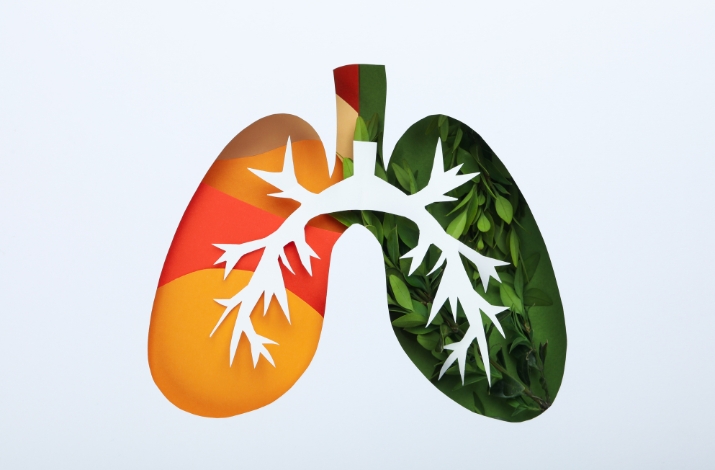How Nutrition Affects Lung Health

Lung disease affects hundreds of millions of people worldwide. Asthma and chronic obstructive pulmonary disease (COPD) are the two most common lung diseases, and COPD is one of the leading causes of death across the globe.
Asthma is an inflammatory lung disease that can dramatically impact quality of life. Approximately 1 in 13 people in the United States suffer with it [1]. Flare-ups can severely affect activity levels and can lead to hospitalization. The condition costs the US economy a staggering $81 billion a year in medical expenses, missed school and work, and even death [2].
Helping people manage their asthma has become a top priority for the CDC, with an emphasis on modifiable risk factors, like smoking, allergens, and pollutants. Another major risk factor for asthma is obesity [3].
Evidence overwhelmingly shows that weight loss has a positive effect on reducing asthma symptoms and on lung health [4,5,6]. But the scientific community has taken a greater interest in the role of diet, as well. A case report published recently details marked improvement in asthma after the patient started a ketogenic diet without any other lifestyle changes [7]. After four months on a ketogenic diet, the patient lost almost 45 pounds, blood pressure was reduced, and the patient experienced total alleviation of asthma symptoms.
Furthermore, in a 2020 rodent study, researchers found that mice switched to a ketogenic diet showed a significant reduction in inflammation in the lungs [8].
Papers like these are part of a growing body of evidence that a ketogenic diet can positively impact asthma [9]. But research suggests that the benefits from a low carb ketogenic diet may extend to other inflammatory lung conditions.
The ketogenic diet is well-established as an anti-inflammatory diet [10,11,12]. When we forego carbohydrates in favor of fat and protein, the body enters into ketosis and uses dietary fat and its own fat stores for fuel. When the body is in ketosis, the liver breaks down fatty acids and releases three ketone bodies. The most important of these ketones for inflammation is beta-hydroxybutyrate, or BHB. BHB both blocks pro-inflammatory immune system receptors and reduces the release of pro-inflammatory cytokines [13].
As ketogenic diets have anti-inflammatory properties and have been linked to asthma improvements, some researchers have theorized that the diet could improve symptoms and slow the progression of another lung disease: COPD.
Chronic Obstructive Pulmonary Disease is a serious inflammatory respiratory condition marked by worsening breathing difficulties. It affects some 16 million Americans, and while smoking is the main cause for COPD, obesity is another risk factor for developing the disease. The economic cost is roughly 50 billion dollars a year, while the human cost is, of course, incalculable [14].
COPD is considered to be degenerative and thought to have no cure. Yet, some lung specialists and researchers see exciting improvements in patients with COPD who adopt ketogenic diets [15].
A small clinical trial with 60 patients with COPD saw notable improvement in lung function after just three weeks on a ketogenic diet [16]. This led the researchers to recommend a low carbohydrate diet as a tool in managing COPD. While a great number of anecdotal reports indicate patient-observed improvement with a ketogenic diet, another recent case report strengthens this connection. The case study presented a patient with COPD who saw substantial improvements in symptoms after adopting a ketogenic diet for two years [17]. The patient’s inflammatory markers decreased into the normal range, and he saw an increase in forced expiratory volume of 37.5% compared to before the diet. The authors concluded, “this case suggests ketogenic diets could have therapeutic potential in COPD.”
Takeaway:
With the host of benefits the ketogenic diet is known for, lung health deserves to be added to the list. If you’re looking to breathe a little easier, consider adopting a ketogenic lifestyle.
References
- https://aafa.org/asthma/asthma-facts/
- https://www.thoracic.org/about/newsroom/press-releases/journal/2018/asthma-costs-the-us-economy-more-than-80-billion-per-year.php
- https://www.cdc.gov/asthma/asthma_stats/asthma_obesity.htm
- https://www.ncbi.nlm.nih.gov/pmc/articles/PMC3392696/
- https://diabetes.org/blog/weight-loss-improves-lung-function
- https://www.ncbi.nlm.nih.gov/pmc/articles/PMC4899150/
- https://pubmed.ncbi.nlm.nih.gov/36879703/
- https://www.sciencedaily.com/releases/2020/04/200407131457.htm
- https://jamanetwork.com/journals/jamapediatrics/article-abstract/1175406
- https://www.ncbi.nlm.nih.gov/pmc/articles/PMC7804255/
- https://www.ncbi.nlm.nih.gov/pmc/articles/PMC5981249/
- https://www.ncbi.nlm.nih.gov/pmc/articles/PMC9229939/
- https://www.ncbi.nlm.nih.gov/pmc/articles/PMC4352123/
- https://www.cdc.gov/copd/data.html
- https://www.yahoo.com/video/keto-diet-can-help-people-breathe-easier-120018635.html
- https://pubmed.ncbi.nlm.nih.gov/12620524/
- https://www.ncbi.nlm.nih.gov/pmc/articles/PMC8358145/
This article is for informational and educational purposes only. It is not, nor is it intended to be substitute for professional medical advice, diagnosis, or treatment and should never be relied upon for specific medical advice.


















